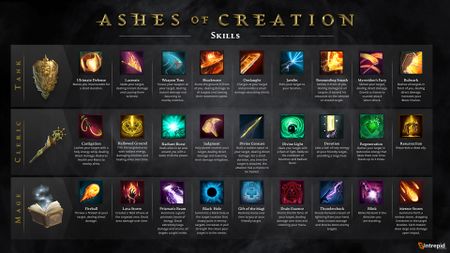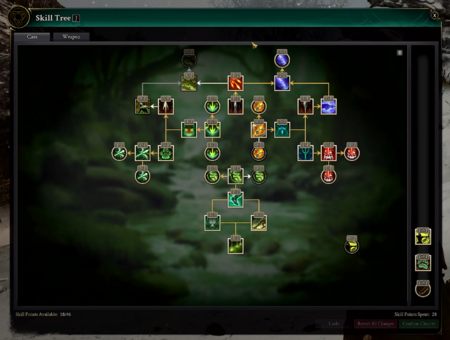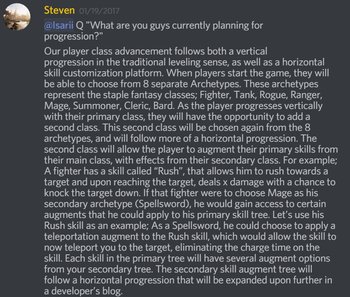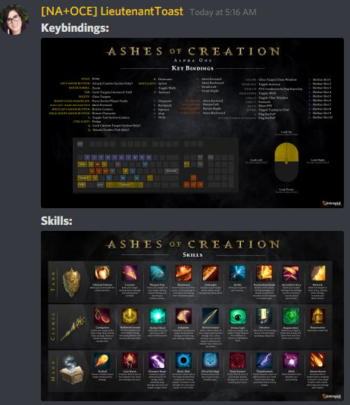Class progression
Class progression in Ashes of Creation proceeds as follows:[1]
- Players receive skill points as they level. These can be used to level up skills within their skill tree.[6]
- It will not be possible to max all skills in a skill tree.[6]
- A player may choose a secondary archetype when they reach level 25.[1][2] The combination of primary and secondary archetypes is referred to as a class.[2][5][7]
- The secondary archetype does not provide additional skills.[8]
- Secondary archetypes may be changed, but not "on-the-fly".[4][9]
- The player can then augment their primary skills with effects from their secondary archetype.[2][3]
- Class progression does not relate to a player's artisan progression.[10]
- World events do not directly impact class effectiveness but there may be ancillary effects in terms of availability of equipment, enchantments or tattoos.[11]
Classes by archetype combination
With 8 Archetypes to combine, players may choose from 64 total combinations to create their class.[2][5][7]
Class abilities

If from the eight archetypes whatever you choose as your secondary, you're going to receive a choice of augments that relate to some core ideal of that class. You know like a tank is about controlling the battlefield, is about surviving. The mage is about dealing damage and elements and ability in AoEs. The rogue is going to be about stealth and critical damage. So those augments are going to to play towards those identities.[13] – Steven Sharif
The idea behind the system is that you're skirting the line through these augmentations of your role, right. We have the traditional holy trinity that's present in class designs for MMOs and it's often that those either are not deviated at all or completely deviated from entirely. The augment is to offer a balance between that where you still maintain the semblance of that trinity system while offering the opportunity to customize your play experience towards one of the other angles in the triangle.[14] – Steven Sharif
Primary skills (class abilities) are based on a player's archetype.[15][3]
- A player may choose a secondary archetype when they reach level 25.[1][2] The player can then augment their primary skills with effects from their secondary archetype.[15][1][2][3][16]
- Outside of class-specific skills there may be a subset of universal skills, such as active block and dodge.[17]
- Class skills are not affected by the type of weapon that is equipped.[18]
- Primary skills in Alpha-2 are expected to be very different to those in Alpha-1.[19]
Skill points

What you're seeing at a high level here is just what you'd pretty much expect of a traditional skill. We're doing something a little more advanced than just like a bottom up structure, because we're being a little bit more free-form in this iteration. This will obviously see more UI iterations in the future, but you'll see a mix of active and passive abilities here. Actives are indicated by their square shape, while the circular ones are representing passives; and one thing to note as well is that these passives are aiming to be a little more interesting than just like, this ability does more damage now, or it has a lower cooldown. We do have some of those too, but the goal with a lot of these passives in addition to that is to allow people to lean into unique play styles. So you'll notice that some of them are are changing your gameplay in meaningful ways; and that's the direction we want to take um player and character customization as a whole.[20] – Tradd Thompson
Players receive skill points at specific points as they level.[21] These can be used to level up skills (increase their rank) within their active, passive or combat/weapon skill trees.[22][23][24][6]
- Making active skills capable of receiving additional skill point allocations and unlocking additional features so that from a player agency standpoint it's going to be up to you whether or not you want to be more diverse but less depth- wider and not taller, in some of these skill choices. Or if you want to be very very tall, that's going to be something that is up to the player in that regard.[25] – Steven Sharif
- Skill points will accrue at specific XP milestones, such as 1/4, 1/2, 3/4 progress through the level, so as to avoid creating an imbalance with experience debt.[21]
- We do have this concept of experience debt that does accrue and we don't want to create an imbalance between skill points acquired versus experience, so we're going to predicate your skill points acquisition based on benchmarks you reach when leveling through a level. So these are going to be at specific points in the level, like one quarter progress, to half progress, to three quarters progress: you're going to get an influx of skill points and then you'll be able to allocate them into your skill tree.[21] – Steven Sharif
- Skill points can be used to unlock universal skills at the expense of unlocking class-specific skills.[26]
- Respeccing (resetting and reallocating) adventuring skills may require travelling to a specific location rather than being able to be done on-the-fly.[27][4]
- Augments do not cost skill points.[28] It was previously stated that certain augments will have more expense required on the skill point side.[29]
- It will not be possible to max all skills in a skill tree.[6]
- In terms of skill progression, players can choose to go "wide" and get a number of different abilities, or go "deep" into a few specific abilities.[30]
Class augments
A player may choose a secondary archetype when they reach level 25.[1][2] Each secondary archetype offers four different schools of augmentation.[31][32][2][33] Each augment school affects a primary archetype's skills in different ways.[34]
- For example: A Mage offers Teleportation and elemental schools of augments. These augments will affect a Fighter's primary skills differently than a Cleric's.[2][34]
- When you reach the class phase, which is around level 25 and you introduce that secondary archetype selection to create your one of 64 classes, then you'll have a number of augments that you'll be able to apply on a per-ability basis; and your core ability kit comes from your primary archetype selection; and those augments will change the look and feel of those abilities; and some will have the affect to create more darker thematic aspects to it. Or just generally different aesthetics to the abilities that represent the secondary [archetype] selection.[1] – Steven Sharif
- The player can then augment their primary skills with effects from their secondary archetype.[35][15][1][2][3]
- The intent behind the augment system is not to provide new active abilities. They're intended to augment existing active abilities that are provided through your primary archetype; and so your secondary archetype selection completes your class selection, of which there's 64 types and you get augment skills that can apply certain attributes and mechanics to your existing active skills. So, if you have certain abilities, like a backstab as a Rogue primary archetype, and you take that healer secondary archetype selection, now the properties of your backstab will still remain the same as an active ability, however it might include things like life steal, or it might include things like susceptible weakness to the target, and reduces their healing because the definition of what those augments are intended to provide based on the archetype selected for the augments is within the schools of magic that live for that archetype: so a Cleric is about balancing life and death and the control of those types of hit points.[35] – Steven Sharif
- Each skill in the primary tree will have several augment options from the secondary tree. This is an example of horizontal progression.[3]
- The progression system for augments is very similar to the class progression system.[36]
- Augments to primary skills can fundamentally change the way the ability works - adapting what the ability once did to incorporate the identity of the secondary archetype/class.[37]
- Augments do not cost skill points.[28] It was previously stated that certain augments will have more expense required on the skill point side.[29]
- There's going to be a certain threshold at which you can no longer augment your active abilities based on the decisions you've augmented previous abilities, so you'll have to pick and choose which ones you want to apply the augments towards.[29] – Steven Sharif
- Secondary archetype augments allow different aesthetics to apply to primary abilities that reflect the secondary archetype selection.[1]
Universal skills
Universal skills, such as active blocking and dodge rolling, are able to be unlocked by all archetypes.[26][17]
- Outside of your class-specific skill tree, there's going to be a subsection of a few skills that are universal, like active block, like dodge; and I think what we're going to do- or at least what we're going to be discussing here- is those universal skills will have progressions that might align with your passive tree; and you can spec skill points into progressing additional features of those universal abilities that you will have access to. So I think that's probably going to be the direction that we're going to take.[17] – Steven Sharif
- Skill points can be used to unlock universal skills at the expense of unlocking class-specific skills.[26]
- Q: Will each archetype be equally efficient with universal skills, like dodging and active blocking, or will each of them have their own versions and flavors, or will some people be more powerful than others?
- A: We want to provide a progression path that's shared for those universal skills across all the archetypes. So when you spend skill points, you can choose to spend them within the universal skill set and unlock particular ability types for the universal skills as well, but you will be spending them from the skill points that you would normally spend within your class-specific skill tree; and this offers again a different wheel of customization that I think is interesting.[26] – Steven Sharif
- The developers will be testing the use of separate energy mechanics for universal skills in Alpha-2.[42]
- Universal skill progression may align with a player's passive skill tree.[17]
Class-specific quests
There will be class-specific quests in Ashes of Creation.[43]
There's going to be a lot of shared quests but there's also going to be class-specific quests; and the reason for that is that some classes are better at others than doing certain things and that'll play itself out through the general community quests. That's fine, but there are certain periods from a designer's perspective where you want to make an encounter be the antithesis of what a player is good at. It also gives them perspective because we have a more fluid class combination system where you can play the line in your traditional role by adding a secondary class that's different from your primary classes role. The benefit of having these class-specific quests early on especially in an archetype is that you can come to a determination and have greater experience for the things you're not good at. So you know how to progress your class in the future with the things you have access to that are different from what you're good at.'[43] – Steven Sharif
- Those Quests will be influenced by the player's class progression via their choice of primary and secondary archetypes.[43]
So you want to give them storyline that's relevant and make sense for them to their class progression. If I'm a fighter I should be going to a barracks and learning from this dude early on. Later on if I want to take on that mage secondary and I'm more arcane in the things I do, or more based in the essence, then yeah it makes sense for my also again for a catered quest to me that lets me focus on that route in the narrative.[44] – Steven Sharif
See also
References
- ↑ 1.0 1.1 1.2 1.3 1.4 1.5 1.6 1.7 Livestream, July 28, 2023 (1:04:27).
- ↑ 2.00 2.01 2.02 2.03 2.04 2.05 2.06 2.07 2.08 2.09 2.10 Interview, July 18, 2020 (1:05:04).
- ↑ 3.0 3.1 3.2 3.3 3.4 3.5

- ↑ 4.0 4.1 4.2 Interview, July 29, 2020 (54:44).
- ↑ 5.0 5.1 5.2 Ashes of Creation class list.
- ↑ 6.0 6.1 6.2 6.3 Livestream, July 28, 2017 (19:05).
- ↑ 7.0 7.1

- ↑ Livestream, May 3, 2017 (50:50).
- ↑ Livestream, July 18, 2017 (37:43).
- ↑ Livestream, July 31, 2020 (1:31:11).
- ↑ Podcast, April 11, 2021 (54:35).
- ↑

- ↑ Livestream, October 16, 2017 (1:00:44).
- ↑ Interview, August 8, 2018 (22:27).
- ↑ 15.0 15.1 15.2 Livestream, December 19, 2023 (1:20:41).
- ↑

- ↑ 17.0 17.1 17.2 17.3 Livestream, November 19, 2021 (50:38).
- ↑ Video, September 30, 2022 (17:00).
- ↑ Livestream, September 24, 2021 (1:18:06).
- ↑ 20.0 20.1 Video, December 19, 2023 (5:29).
- ↑ 21.0 21.1 21.2 Livestream, July 28, 2023 (1:03:27).
- ↑ Interview, July 29, 2020 (55:44).
- ↑ Interview, July 19, 2020 (53:59).
- ↑ Interview, July 18, 2020 (1:07:51).
- ↑ Livestream, August 28, 2020 (1:19:24).
- ↑ 26.0 26.1 26.2 26.3 Livestream, December 19, 2023 (1:49:56).
- ↑ Livestream, December 19, 2023 (1:46:12).
- ↑ 28.0 28.1 Forums - Livestream Q&A 2022-08-26.
- ↑ 29.0 29.1 29.2 29.3 Interview, July 18, 2020 (1:07:06).
- ↑ Livestream, November 16, 2017 (30:02).
- ↑ Podcast, September 29, 2021 (30:04).
- ↑ Livestream, June 25, 2021 (1:05:01).
- ↑ Livestream, February 9, 2018 (41:56).
- ↑ 34.0 34.1 Livestream, December 17, 2019 (1:13:14).
- ↑ 35.0 35.1 Livestream, January 31, 2024 (5:00).
- ↑ Livestream, July 26, 2019 (1:09:22).
- ↑ February 8, 2019 - Questions and Answers.
- ↑

- ↑

- ↑ Interview, May 11, 2018 (53:15).
- ↑ Livestream, 2018-04-8 (PM) (20:45).
- ↑ Livestream, December 2, 2022 (1:05:08).
- ↑ 43.0 43.1 43.2 Podcast, April 11, 2021 (44:29).
- ↑ Podcast, April 11, 2021 (46:10).